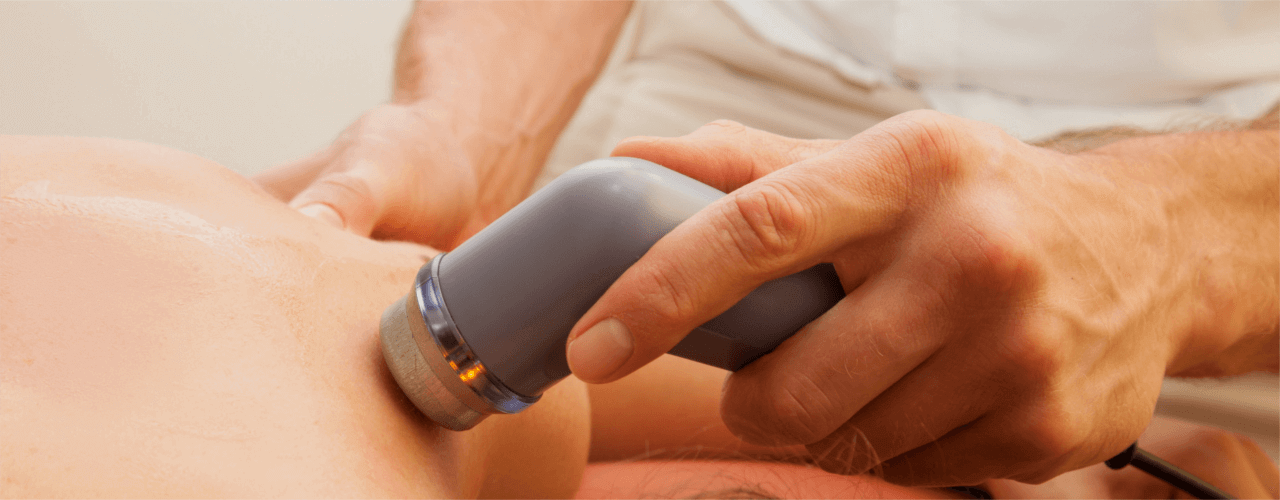Ultrasound
Ultrasound is a type of mechanical energy that has been used for many years to treat chronic pain and improve the healing process. There are several specific ways a physical therapist can use ultrasound therapy to treat injuries and reduce pain. Contact Walker Physical Therapy today to learn more about how ultrasound therapy can help you promote healing, reduce pain, and improve your ability to perform daily activities and tasks.
How does ultrasound technology work?
Ultrasound therapy is the use of sound waves to treat a variety of muscle, bone, and ligament conditions. The sound waves cause vibrations which generate heat. When tissues in the body are vibrating, the friction produced occurs at the molecular level. This ultimately causes the temperature in the tissues to rise. This is one of the many advantages ultrasound application provides. It can penetrate deep into the tissues in ways that a hot pack can’t.
During physical therapy, gel is normally used on the surface of the applicator to minimize friction as well as to promote the transmission of the ultrasound waves. The waves are then absorbed by your tendons, ligaments, and connective tissues.
What does ultrasound therapy do in the body?
There are generally two ways ultrasound can work in your body to heal and repair tissues during physical therapy services. The first is that it provides thermal energy, or heat. The second is the non-thermal benefits.
- Thermal – When using ultrasound, heat enters the tissues at a deep level. This can increase circulation while reducing pain. Heat can also enable muscles to more easily stretch. Thermal energy produced by ultrasound during physical therapy can, therefore, loosen tight muscles and tendons.
- Non-Thermal – Ultrasound also works in specific ways that are unrelated to the transfer of heat. When energy enters the body through ultrasound it creates tiny gas bubbles that gather around the tissues. These bubbles contract and expand at a rapid pace. This is called cavitation.
What are the benefits of ultrasound therapy?
- Increase Blood Flow – Just as cold decreases blood flow, heat will increase it. Ultrasound therapy will cause your blood vessels to increase in size and therefore increase the blood flow. Increased blood flow means more nutrients will be delivered to the area of your injury while waste is carried away. This ultimately enhances the healing process.
- Reduce Swelling and Inflammation – Ultrasound therapy has been shown to reduce stiffness in muscles and joints while increasing range of motion. Once blood flow is increased and swelling and inflammation is reduced, this will allow your muscles and joints to respond more favorably to manual stretching exercises and different types of massage.
- Promote Tissue Healing – Ultrasound not only improves your muscles and joint range of motion, but can aid in the healing of wounded tissues. The metabolism of the cells in the tissue are affected by ultrasound. The vibration produced by the ultrasound can help prevent scar tissue from forming.
What conditions can be treated with ultrasound?
While increased blood flow, reduced swelling and inflammation, and tissue healing are general benefits of ultrasound, there are several specific conditions these processes can help heal. The following are a few of the physical conditions that can be treated.
- Bursitis and Tendonitis – Frozen shoulder is a form of bursitis that can be effectively treated with ultrasound therapy.
- Muscle Strains and Tears – The use of ultrasound therapy can reduce the amount of time sprains, strains, and tears take to heal.
- Muscle Spasms – Heat applied at various places on or near the site can help relax the muscles and decrease spasms.
- Rheumatoid Arthritis and Osteoarthritis – These are chronic conditions that respond well to the deep heat provided by ultrasound.
- Bone Fractures – Healing of bone fractures can be promoted by the use of low-intensity ultrasound. Ultrasound has also been found to be a more cost-efficient and less invasive tool for diagnosing certain types of stress fractures.
These are just a few of the many conditions that can be treated with ultrasound physical therapy. Other conditions and diseases that may be improved or healed include whiplash, phantom limb pain, dental pain, and even certain types of cancer.
How can I find a qualified physical therapist?
A physical therapist who is trained in ultrasound therapy may be able to help you treat several types of ailments. It’s important to find a therapist who has experience evaluating and treating the condition you have. A trained therapist may use a variety of ultrasound techniques to treat your condition. Oftentimes ultrasound therapy will precede different types of massage and exercise.
The goal of the physical therapist is to alleviate your symptoms and promote healing. This will ultimately improve flexibility and range of motion. It will also help reduce or eliminate any pain associated with your injury or ailment. A physical therapist can also teach you exercise strategies that you can do on your own and ways you can improve your posture and gait to avoid future injury. The goal of the physical therapist is to ultimately help you improve strength, the range of motion, and daily functionality. Contact Walker Physical Therapy today for more information regarding how ultrasound therapy can treat your condition.



